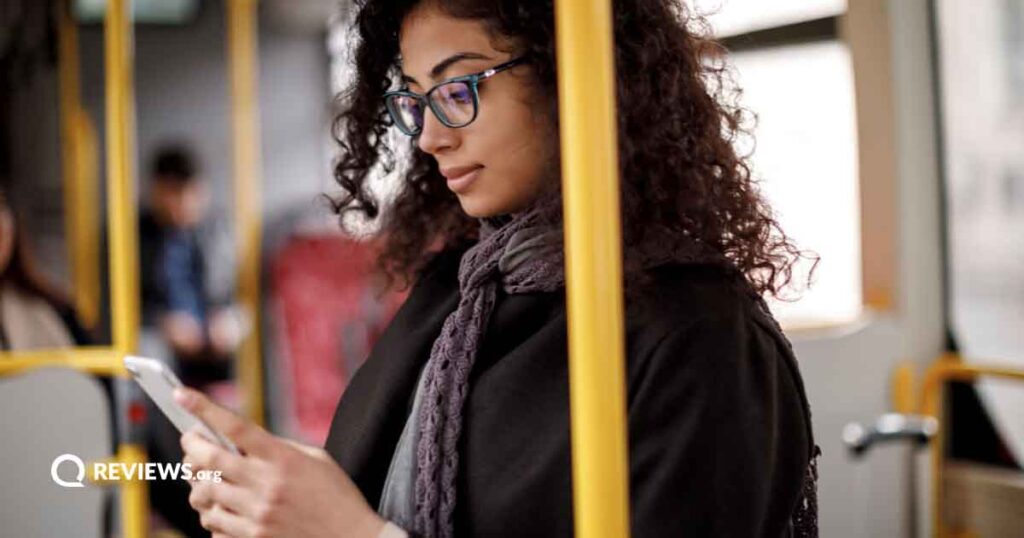Does Verizon's data speeds match its awesome coverage? Not really.
Verizon Wireless Speed Test
Verizon has been the king of coverage for as long as Reviews.org has existed, but it's always been a closer race when it comes to data speeds. Let’s see how Verizon performs during a hands-on speed test.
Data speeds refers to how quickly your phone can download information from the internet. The faster your phone can download stuff, the more quickly you can browse the internet.
What are Verizon’s advertised speeds?
According to Verizon, download speeds range from 5–50 Mbps, which is a massive range. We sampled over 40,000 Verizon mobile users and got an average download speed of 32.2 Mbps—right in the middle of the advertised range. From our data, Verizon falls just slightly behind T-Mobile (by about .5 Mbps) for the fastest average download speeds. It's the same story with upload speeds, Verizon gets beat out by T-Mobile by about 2.8 Mbps. Here's what the averages look like amongst the Big Three wireless networks.
Honestly, we hoped for better data speeds on Verizon considering it offers the best network and charges the most for its data plans. But let’s get some hands-on testing with Verizon and see how its data speeds hold up in the wild.
Verizon wireless speed test
We’re going to test Verizon’s data speeds in three different locations—from a home in the suburbs, a crowded supermarket in the city, and as deep in the wilderness as my basic Nike’s can take me. At a glance, these are the speed tests results we got for Verizon.
Speed test from home
- Download speed: 13.9 Mbps
- Upload speed: 11.6 Mbps


I honestly couldn’t believe this Verizon speed test result at first. I performed the test over and over, and even used a different speed test tool. Nope, turns out it's true—Verizon has absolutely terrible data speeds in my neighborhood. The final nail in the coffin was when I tried to open a YouTube video on my wireless connection, and uh, this happened.
Don’t be fooled, that spinning wheel isn’t anything on your end—that’s literally how long it took me to open YouTube. I was tempted to stop recording after about 15 seconds or so, but I wanted to see it to the end. It took about 30 seconds to open a YouTube video. We’re not mad Verizon, we’re just disappointed.
Speed test at the supermarket
- Download speed: 82 kilobytes per second
- Upload speed: 524 kilobytes per second
For this speed test, I went to a grocery store that I don’t usually frequent. The results were, uh, terrible. But you should definitely take it with a grain of salt.


I kid you not, I walked around this store for an hour trying to find a spot with a decent signal, but the numbers you see above you are the best that could be found. I asked an employee (an AT&T user) if they had trouble with their cell phone service, and they responded that this particular grocery store is a bit of a dead zone. Even with its top coverage, Verizon still isn’t immune to dead zones.
It takes 1000 kilobytes to make a megabyte, so needless to say, Verizon’s wireless speeds in this particular supermarket were absolutely abysmal.
We will spare you the YouTube test—it didn’t even work.
Speed test from a hike
- Download speed: 73.9 Mbps
- Upload speed: 23.4 Mbps
One of Verizon’s main claims to fame is its impressive coverage in rural areas, but after the suburb speed test going so poorly, I can’t say I was optimistic. However, Verizon returned to form with our speed test in the mountains of Utah.


Verizon pulled down an impressive 73.9 Mbps download speed and a 23.4 Mbps upload speed. For the record, that’s the second-highest download speed we’ve seen among major providers, and the highest upload speed we’ve seen. In other words, you should have no problem uploading your Instagram stories during your hike, and you can check your feed during a rest. Don’t let anybody give you grief for checking your phone during a hike—nature is great and all, but you know, sometimes we need a break.
Verizon performed well (as expected) in our YouTube test, only giving me about three rotations of the buffering circle before loading the video. And yes, in case you’re curious, I am very tempted to buy the new Tony Hawk Pro Skater remake.
Verizon Speed test takeaways
This was a sobering series of tests for Verizon—it turns out that even the best coverage provider isn’t impervious to dead zones. Honestly, I was expecting Verizon to outperform AT&T and T-Mobile in every category, basically anywhere we went, and that wasn’t the case. The only place where Verizon shined was during a hike, and even then it fell behind AT&T’s data speeds.
Granted, this series of tests took place within a 80-mile radius in Utah, so your experience will likely be different in different areas of the country. But overall, Verizon underperformed our expectations when it comes to data speeds.
Verizon cell phone plans
Verizon still averages around 32 Mbps of download speeds around the country, and covers 70% of the country with 4G coverage. Even if our tests fell outside Verizon’s strongest coverage, you might have a much better experience. Here’s what Verizon cell phone plans look like right now.
Related Articles




